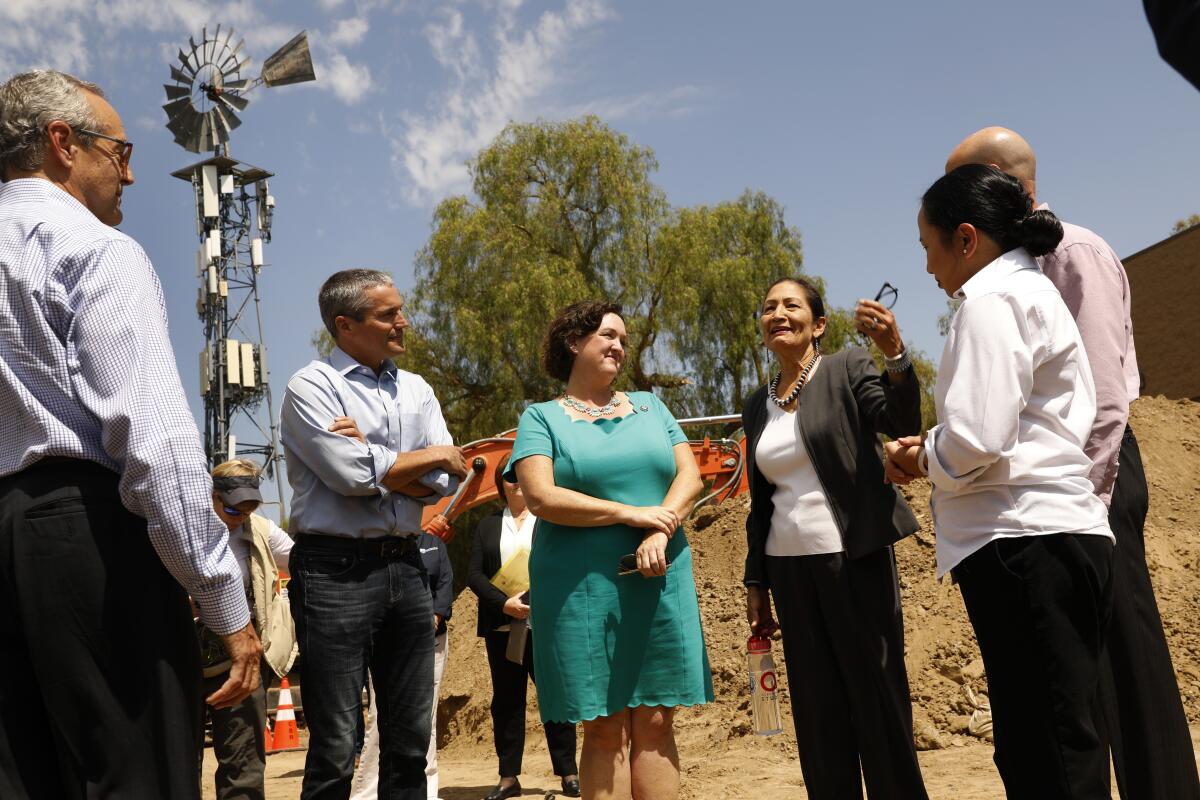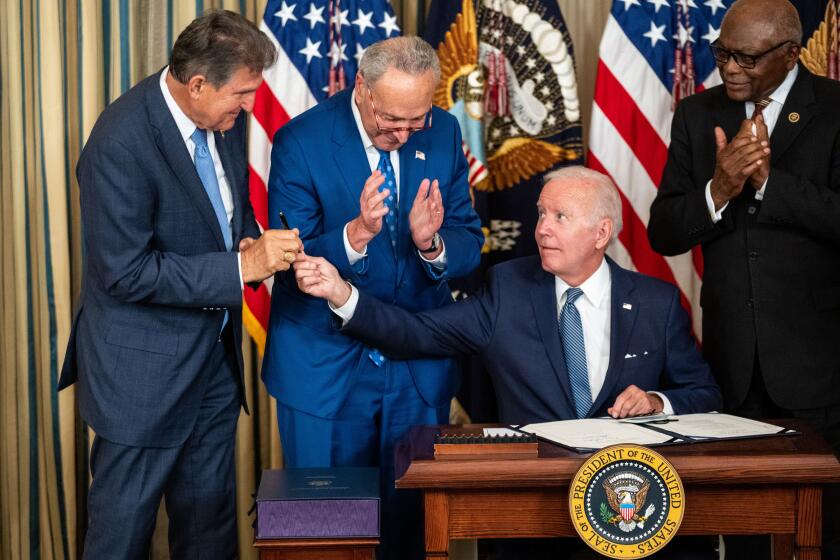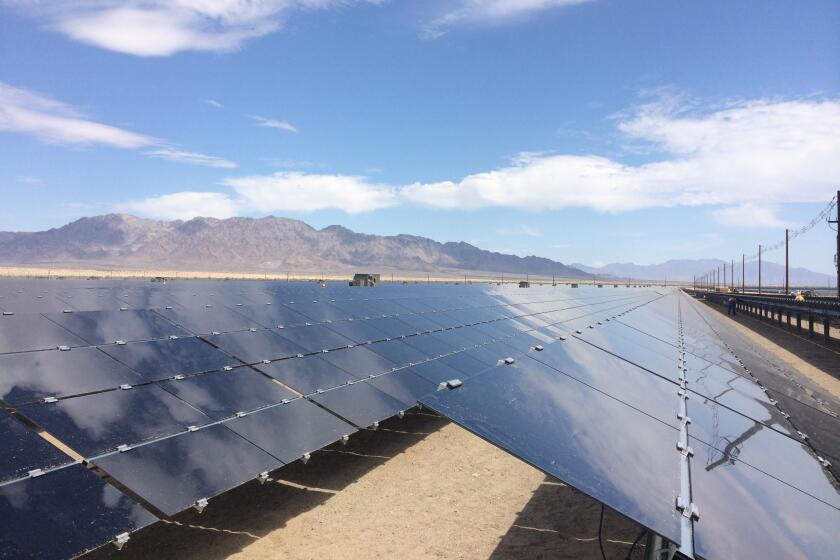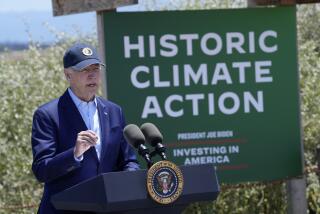Democrats launch major effort to sell Inflation Reduction Act to voters

- Share via
IRVINE — Democratic lawmakers, members of President Biden’s Cabinet, and allied organizers and activists are kicking off a multipronged public relations campaign aimed at ensuring voters understand — and appreciate the benefits of — the $700-billion climate-change and drug-prices bill that Biden signed Tuesday.
Top Democrats believe that popular, long-sought policy changes in the so-called Inflation Reduction Act will help their party retain congressional majorities in November’s midterm elections.
In Irvine on Thursday, Rep. Katie Porter, a swing-seat Democrat, stood in front of a hulking orange Hitachi excavator at the Irvine Ranch Water District, which is expanding its reservoir using funds from last year’s $1-trillion infrastructure overhaul package. Appearing alongside Interior Secretary Deb Haaland, Porter noted that Democrats’ latest legislation — the central pillars include $369 billion to combat climate change and long-sought changes to lower the cost of prescription drugs — will continue to support the water district and similar facilities across the country.
“This new law invests $4 billion in water conservation, efficiency and restoration, and that supplements the more than $50 billion already allocated in the bipartisan infrastructure law to help us modernize our water infrastructure and improve our drinking water supply,” Porter said.
A day earlier, Agriculture Secretary Tom Vilsack was in western Colorado with Sen. Michael Bennet, touting the latest bill’s investments in combating climate change.
Speaking to a group of farmers and ranchers inside a cider production facility in Palisade, Bennet, a vulnerable Democrat seeking a third six-year term, emphasized the law’s $4 billion in drought mitigation funds, its $20 billion for land conservation projects and $5 billion for improving the health of forests and preventing fires.
“We’ve passed some interesting legislation,” Bennet told the group. “And at every step along the way, we’ve been trying to make sure that we’re supporting our producers,” he continued, touting the new funding for forestry as “a record amount.”
Since the first days of his presidency, Biden has said that his party must clearly and constantly explain its actions to the public. Recalling the Obama administration’s struggle to sell the Affordable Care Act in 2010 ahead of an eventual midterm drubbing, Biden urged Democrats to unabashedly tout the benefits of the $1.9-trillion American Recovery Plan they pushed through in March 2021.
“Barack was so modest, he didn’t want to take, as he said, a ‘victory lap,’” Biden told House Democrats at the time. “I kept saying, ‘Tell people what we did.’ He said, ‘We don’t have time. I’m not going to take a victory lap.’ And we paid a price for it, ironically, for that humility.”
Biden’s team hopes that their more fulsome effort will lead to a different result for Democrats this November. Republicans, who after the healthcare law’s passage in 2010 stoked fears about “death panels,” rising premiums and fewer choices of doctors or plans, have also attacked the new bill as costly and partisan. They’ve questioned whether it will actually reduce the cost of goods and services and suggested that the $80 billion aimed at reducing Internal Revenue Service backlogs will lead to more audits on low- and middle-income households.
$700-billion package, aimed at curbing climate change and drug costs, may help Democrats this fall. But it comes at a fraught time for U.S. democracy.
But today’s GOP is often more preoccupied with what animates the party’s base — culture wars, grievance and tests of loyalty to former President Trump — than policy debates and the legislative process.
“The frame of ‘getting things done’ is just not appealing to Republicans,” said Sarah Longwell, a Republican consultant and outspoken Trump critic who regularly convenes focus groups of voters of all stripes. “That being said, Biden finding his stride, passing some things — that does a lot for him with Democrats, who have wanted a lot of these things for a long, long time.”
The key for the White House, and for Democrats on the ballot across the country, will be convincing less-partisan voters to see their agenda in a positive light — and as different from the Republican agenda.
“The last several weeks have strengthened motivation among Democratic voters and, at same time, have been an accelerant in making the election a choice [between the two parties], not a referendum on us,” said one administration official, who was granted anonymity to speak candidly about the Democrats’ election chances. “The incumbent always needs it to be a choice.”
According to recent polling, the new law and its individual components are already broadly popular. A Morning Consult survey Wednesday showed that 76% support the cap on prescription drug prices. The provisions allowing Medicare to negotiate drug prices with manufacturers and the $2,000 annual cap on out-of-pocket drug costs for Medicare earned the support of 70% of respondents.
“This is stuff that means something for working families,” said John Anzalone, a Democratic pollster who helped guide Biden’s 2020 campaign and remains close with the White House.
After several difficult months where Biden’s approval rating hovered just above or below the 40% mark, the recent spurt of productivity by Congress has changed the political environment.
“It’s good to be back on the offense,” Anzalone said. “He’s now done what he said he wanted to do during the campaign. There’s going to be $5 [billion] to $6 billion spent between now and Election Day [on the campaign]. What the president has done is: he’s given front-line Democrats the tools to have a real competitive message about what they’ve done for the American people, and also to draw the contrast with Republicans, who voted against all this.”
What will the Inflation Reduction Act do for you?
Biden is planning to celebrate the bill with Democratic lawmakers at the White House just after Labor Day, a major milepost as the midterm election cycle enters the final two-month stretch. By that point, Cabinet officials will have held 35 events in 23 states, according to the White House. Millions of Americans will have seen some of the TV ads Democrats are funding to broaden awareness about and increase support for the new law.
Much of the Democrats’ messaging blitz will target specific constituencies. Build Back Together, a pro-Biden organization launched by the president’s campaign team, has rolled out $1 million in TV, radio and digital media ads that will run in English and Spanish this week in Nevada, Pennsylvania, Wisconsin and Washington, D.C.
At the same time, three progressive organizations are putting $10 million behind another ad campaign highlighting the “transformational” nature of the legislation. One ad, focused on the $369-billion investment in lowering carbon emissions, will appear mostly on cable TV and streaming services used more by younger voters.
“Young climate activists set a high bar for climate action, which was vital to the success of the bill,” said Pete Maysmith, senior vice president of campaigns for the League of Conservation Voters, which is funding the push along with Climate Power and Future Forward USA Action. “Our aim now is to underscore to them the great climate elements in the law so they continue to be energized around this issue.”
In Kentucky on Thursday, Senate Minority Leader Mitch McConnell (R-Ky.) seemed to lower expectations about the GOP winning back control of the evenly divided chamber.
He told reporters there is “probably a greater likelihood the House flips than the Senate,” seeming to betray some frustration about polls showing a few Trump-backed Republican Senate candidates trailing in battleground states like Pennsylvania, Georgia and Arizona, the latter two where Democratic incumbents looked more vulnerable months ago. “Candidate quality has a lot to do with the outcome,” McConnell said.
Conversely, Democrats are suddenly brimming with optimism.
“People assumed Republicans had the midterm election locked up just like they assumed the Atlanta Falcons were going to win that Super Bowl,” Anzalone said, referencing the New England Patriots’ comeback behind then-quarterback Tom Brady after trailing 28-3 in the third quarter in Super Bowl LI in the 2016 NFL season. “Biden is going to be Tom Brady in this scenario.”
Stokols reported from Washington, Vega from Irvine.
More to Read
Get the L.A. Times Politics newsletter
Deeply reported insights into legislation, politics and policy from Sacramento, Washington and beyond. In your inbox twice per week.
You may occasionally receive promotional content from the Los Angeles Times.













